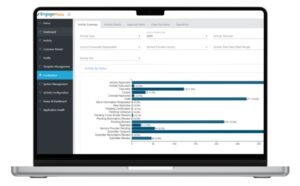
Hard money loans are a great financing option for real estate transactions, especially when traditional lending is not feasible.
A key metric in hard money lending is the Loan-to-Value (LTV) ratio. In recent years LTV has gained prominence as a tool for safeguarding financial stability. This ratio is important in assessing risk for lenders and borrowers alike.
Understanding LTV can significantly impact the decision-making process in securing a hard money loan. Continue reading to learn how lenders assess LTV and what borrowers need to know in markets like Los Angeles, Miami, and Atlanta.
What is Loan-to-Value (LTV)?
The Loan-to-Value ratio represents the amount of a loan compared to the appraised value of the property used as collateral. Lenders calculate LTV by dividing the loan amount by the property value. For example, if a borrower seeks a loan of $150,000 for a property valued at $200,000, the LTV ratio is 75%.
Hard money lenders typically prefer lower LTV ratios. Most hard money loans range between 65% and 75% of the property’s value. This conservative approach helps lenders manage risk, ensuring they have adequate collateral if a borrower defaults.
How to Assess Risk with LTV?
Lenders use the LTV ratio to measure the risk associated with a loan. A higher LTV indicates a greater risk for lenders because it suggests that the borrower has less equity in the property. Conversely, a lower LTV provides more security for lenders, as it shows that the borrower has more equity to protect.
When evaluating a loan, hard money lenders consider several factors:
- Market Conditions:Lenders assess current market conditions to determine property values. In rapidly appreciating markets, such as Los Angeles or Miami, lenders might accept higher LTV ratios due to the potential for increasing property values.
- Property Type:Different property types can impact the LTV ratio. For example, residential properties may have lower LTV limits than commercial properties, reflecting their stability.
- Borrower’s Track Record:Lenders review the borrower’s history and experience in real estate transactions. Experienced investors may negotiate better LTV terms based on their successful track record.
- Exit Strategy:Lenders consider the borrower’s plan for repaying the loan. A clear and feasible exit strategy can lead to more favorable LTV terms.
How Does the LTV Ratio Impact Risk Assessment in Major Markets?

The importance of LTV varies across different markets. Cities like Los Angeles, Miami, and Atlanta exhibit unique real estate dynamics that influence LTV ratios.
- Los Angeles:The competitive nature of the LA market often results in higher property values. Borrowers seeking hard money loans may find lenders willing to extend LTV ratios closer to 75%. However, this comes with higher interest rates, reflecting the increased risk.
- Miami:The Miami real estate market offers a blend of residential and commercial properties. LTV ratios can range widely based on property type and location. Borrowers should be prepared for stringent evaluations of property value, particularly in sought-after neighborhoods.
- Atlanta:Atlanta’s growing market provides opportunities for real estate investors. Here, lenders might offer more competitive LTV ratios due to a diverse range of properties. However, borrowers should still be mindful of the lender’s assessment of local market trends.
What Borrowers Should Know
When seeking hard money loans, borrowers must understand the implications of LTV. Here are key considerations:
- Understand Your Property Value:Obtain a professional appraisal to understand your property’s worth. This knowledge allows borrowers to negotiate better terms with lenders.
- Prepare for Higher Costs:Hard money loans typically come with higher interest rates and fees. Borrowers should account for these costs when evaluating their financing options.
- Be Ready for Scrutiny:Lenders will assess your financial history, project plans, and overall investment strategy. Being transparent and prepared can enable smoother negotiations.
- Utilize LTV to Your Advantage:Understanding LTV can help borrowers make informed decisions. A lower LTV ratio can provide leverage during negotiations, as it demonstrates lower risk to lenders.
Maximize Your Real Estate Opportunities with Insula Capital Group
Investing in real estate demands a solid grasp of the Loan-to-Value (LTV) ratio, as well as the right financial backing. Insula Capital Group offers hard money loans in Los Angeles, Miami, and Atlanta markets to help investors seize opportunities quickly.
Their expert team knows the challenges that come with real estate financing, providing quick approvals and solutions to keep your projects on schedule.
If you’re looking for hard money lenders in Los Angeles, Miami, and Atlanta, Insula Capital Group equips you with the tools to achieve your goals. Contact them today and find out how they can assist you with your real estate goals!
About the Author
The author is a financial expert with extensive knowledge in real estate lending and investment strategies. With years of experience in the industry, they provide insights into financing options that empower investors to make informed decisions in the real estate market.





